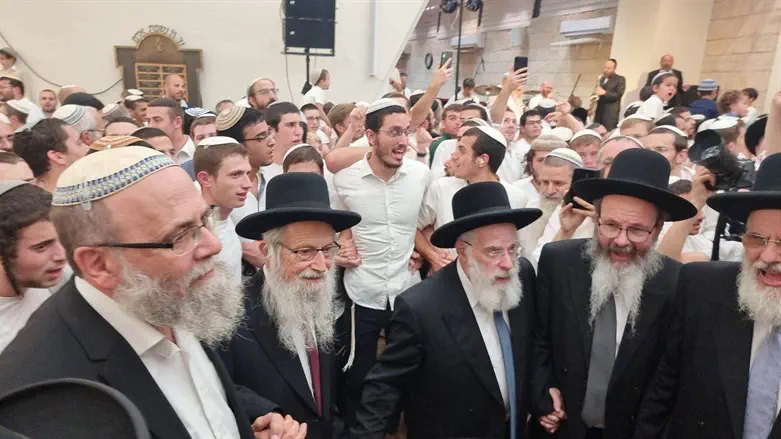
As the State of Israel celebrates its 75th Independence Day, let's take a look at once of its exceptional features: support of Torah study.
Whatever you think about learning Torah, it's indisputable that Israel has the largest concentration of Torah scholars in the world, and that Israel is the only country that provides direct financial support to Torah scholars.
My grandfather, may he live and be well, celebrated his 91st birthday this year. He often relates how, when he was a boy, he would wear a baseball cap over his kippah when he left the house, embarrassed to identify himself as religious. One day, a friend came up to him and said, "Do you really think you can hide it? Just take off the kippah already! Do you really want to be the last religious kid left? It's all over!"
The sense that the world of Torah learning was doomed to extinction prevailed throughout the early years of the State, encouraged by its secular leaders. That sense was also what inspired people like my grandfather and others, such as Rabbi Neria and Rabbi Druckman, to take upon themselves the heavy burden of ensuring that Torah learning survived. Their motto was, "We'll establish a yeshivah in every city, in every town, in every village." Over time, their vision became a reality, a living, breathing reality.
Now for some figures, to give a clearer idea of the immense changes over the past 75 years:
In 1948, it is said, there were only 400 yeshivah students in the entire country, learning in just a few yeshivot. Today, the government pays stipends to around 350 thousand yeshivah students, learning in over 1,600 yeshivot. (These include around 65,000 students over the age of 18 who have army deferrals due to learning Torah full-time.) A one-hundred-fold increase!
In recent years, the Torah world has been increasing at an average rate of over four percent per year.
In Religious-Zionist circles, the increase has also been marked. Just over a decade ago, there were around 2,400 post-high-school yeshivah students learning in 28 yeshivot. Today there are over 40 such yeshivot where almost 5,000 students learn, and the numbers are growing by six percent each year, well above the national growth rate. In fact, during the COVID period, when many feared that the numbers would drop, the opposite occurred and the numbers increased by over 10 percent!
In hesder yeshivot (which combine Torah study with periods of IDF service), there are now around 9,000 students, with another 3,000 in the IDF. There are also around 60 kollelim for advanced Talmudic study for young married men, with around a thousand people learning there, and around 20 pre-military Torah academies where 1,200 students learn, as well as around 25 Torah academies for post-high-school girls where around 1,300 girls students learn.
All told, there are 4,500 households in the Religious-Zionist community where the father is engaged in full-time Torah study. In the haredi community, there are around 85,000 such households. Religious-Zionist men who learn Torah full-time comprise 35 percent of the total number of full-time Torah students between the ages of 22 and 32. A further 10,000 young men learn Torah half the day and work the other half.
Of course, Torah is learned beyond the yeshivot as well. Israel has around 13,500 synagogues and 6,000 community rabbis. Around 10 thousand people take the Rabbinate examinations each year. The government funds around a million Torah classes and 27,500 Torah teachers.
The yeshivot themselves also receive government funding; this year, they are expected to receive a combined total of 1.2 billion shekels, significantly more than last year. This is still just a quarter of the funding provided to university students learning Chinese philosophy or the humanities, so there's plenty of room for improvement, but one must also look at the quarter-full glass and be thankful.
Around a month before Rabbi Druckman passed away, a group of women, all wives of Religious-Zionist Torah students, went to visit him and receive his blessing for a membership club they wanted to set up that would sell subsidised products to full-time Torah students and their families. "When I was a young boy," Rabbi Druckman told the women, "I thought that the Torah world was finished, that it was something that had belonged to the Diaspora. But the reality is that the Torah world is the soul of the State of Israel. It is what gives the state its strength.
"It's not the state that supports the Torah world," Rabbi Druckman continued, "but the Torah world that supports the state. Torah study is what gives the state its energy and ability to be the wonder that it is. Torah study is what gives the country its right to exist and its national pride in its heritage. Torah study is the most important aspect of our history."
We have a long road ahead of us, but today, thank G-d, there is a great deal of Torah learning among the Jewish People, much of it in the merit of the State of Israel.
Moshe Gutman is the director of the Union of Post-High School Yeshivot in Israel.

